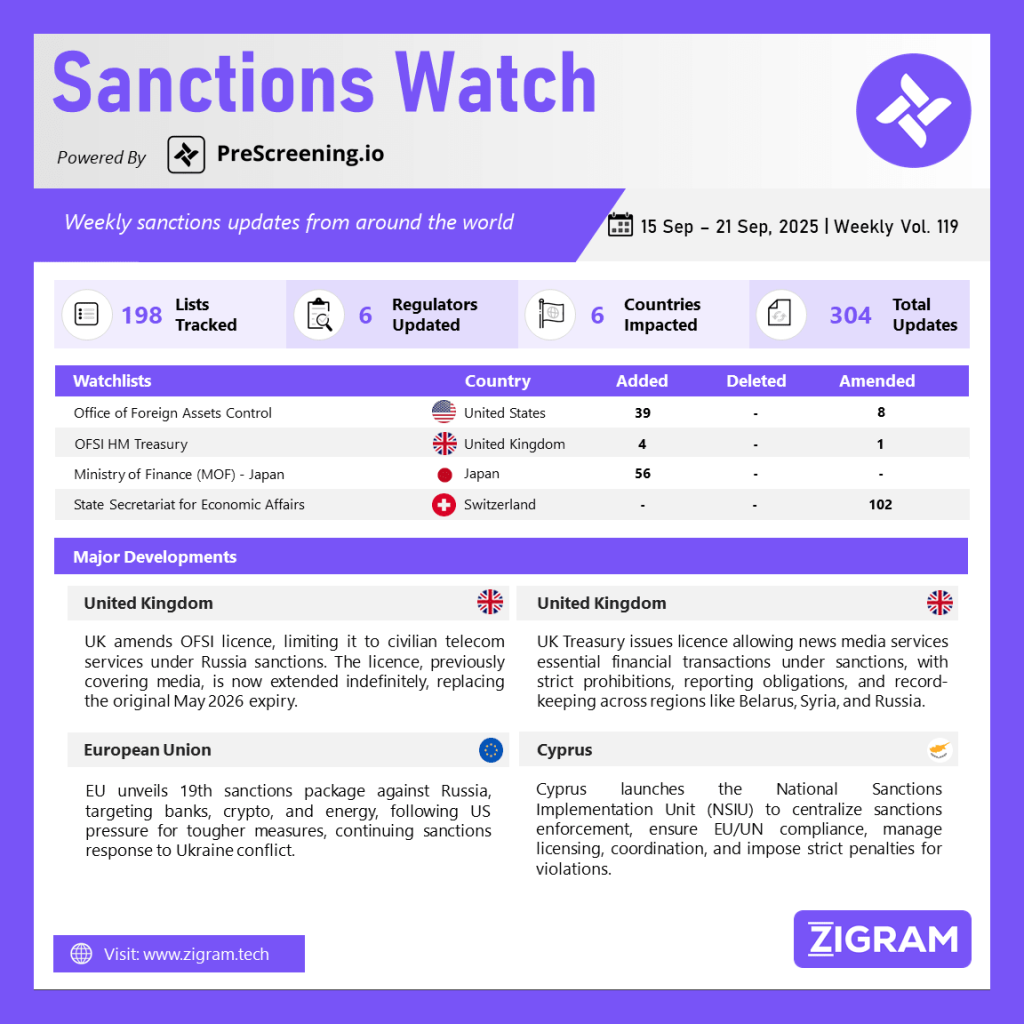Sanctions Watch Vol 119
In the latest edition of our Sanctions Watch weekly digest, we present significant updates on sanction watchlists and regulatory developments.
1. OFSI Updates Russia Sanctions General Licences: Media Permissions Separated, Telecoms Covered Indefinitely
The UK Office of Financial Sanctions Implementation (OFSI) announced updates to General Licence INT/2022/1875276, which previously covered both News Media Services and Civilian Telecommunications Services under the Russia (Sanctions) (EU Exit) Regulations 2019. The amended licence has now been narrowed to focus solely on activities related to the provision of Civilian Telecommunications Services under Regulation 64. In addition, its duration has been extended indefinitely, replacing the original expiry date of May 2026.
2. UK Grants License for News Media Activities Amid Sanctions Regulations
The UK Treasury issued a general license permitting news media services to operate under the UK’s Autonomous Sanctions Regulations. This license allows designated individuals or entities involved in journalistic activities to engage in essential financial transactions, such as paying for services and salaries, within the boundaries of the law. However, it strictly prohibits payments to parties designated for compliance with United Nations sanctions. Key conditions include reporting requirements for payments and the maintenance of accurate records for at least six years.
The license covers various regions, including Belarus, Syria, and Russia, among others, detailing the relevant regulations and permissions that news media must follow to comply with UK financial sanctions. This move aims to ensure that news organizations can continue their operations despite the broad sanctions framework while enforcing accountability and transparency.
3. EU Unveils 19th Sanctions Package Against Russia Amid US Pressure
The European Commission has introduced its 19th sanctions package against Russia, awaiting approval from EU member states. This move follows a one-week delay, influenced by calls from the United States for stricter measures. European Commission Chief Spokesperson Paula Pinho confirmed the adoption of this new package, which targets Russian banks, crypto assets, and energy imports.
The package comes in the wake of US President Donald Trump’s weekend request for European nations to cease their remaining purchases of Russian oil and impose additional duties on countries aiding Russia’s energy exports. This marks the EU’s continued commitment to sanctioning Russia in response to the ongoing conflict in Ukraine, with 18 previous sanctions packages already focusing on sectors such as finance, technology, and energy.
4. Cyprus Establishes National Sanctions Implementation Unit to Strengthen Compliance and Enforcement
Cyprus officially established the National Sanctions Implementation Unit (NSIU, locally EMEK) under the Ministry of Finance, following the enactment of the NSIU Law of 2025. This move consolidates and strengthens Cyprus’s sanctions enforcement framework, aligning with EU and international obligations.
The NSIU replaces the Advisory Committee on Economic Sanctions (SEOK) and the Unit for the Implementation of Sanctions in the Financial Sector (MEK), centralizing responsibility for overseeing sanctions enforcement. Its core functions include monitoring compliance with EU and UN restrictive measures, coordinating with domestic and international authorities, handling licensing and exemption requests, facilitating information exchange, and issuing official guidelines and directives.
The law also introduces transitional provisions, ensuring that existing licenses, exemptions, and pending applications from SEOK or MEK remain valid under the new framework. Furthermore, prior directives will continue to apply until formally revised or replaced.
A significant feature of the NSIU Law is its strict compliance regime. Individuals and entities are now required to report and adhere to sanctions measures, with non-compliance leading to administrative fines, criminal penalties, or both, depending on the severity of the breach.
The establishment of the NSIU forms part of a broader package of reforms, including the Sanctions Enforcement Law and amendments to the Whistleblowing Law, reflecting Cyprus’s commitment to enhancing regulatory integrity and strengthening its role in international sanctions enforcement.
Know more about the product: PreScreening.io
Click here to book a free demo.
Sanctions Watch is a weekly recap of events and news related to sanctions around the world.
- #OFAC
- #Sanctions
- #RussiaSanctions
- #UKSanctions
- #NewsMedia
- #EU
- #Energy
- #Crypto
- #RussiaUkraineWar
- #Geopolitics
- #Compliance

